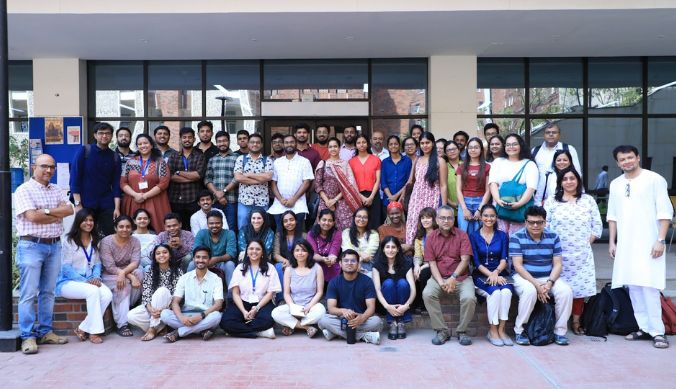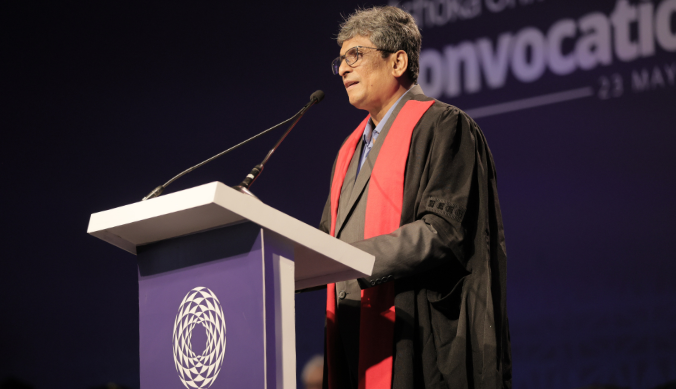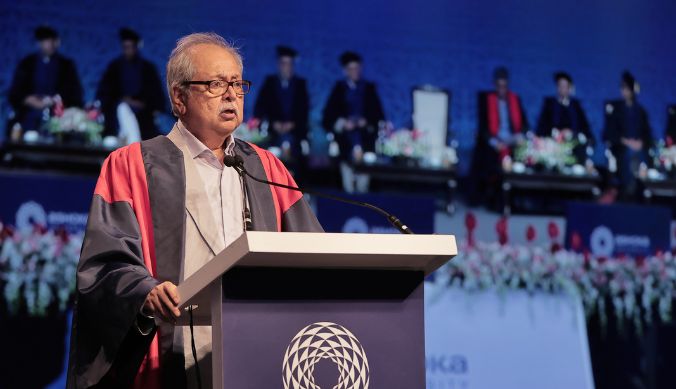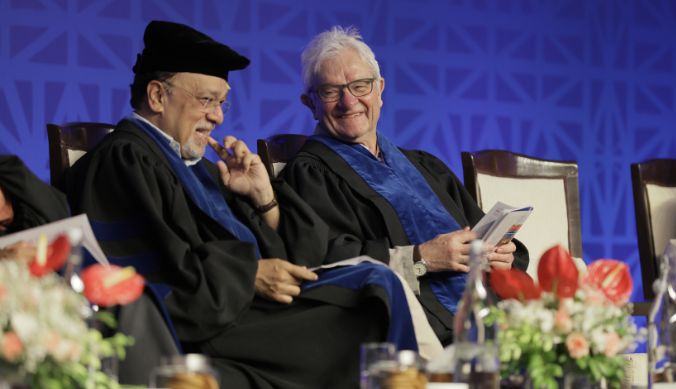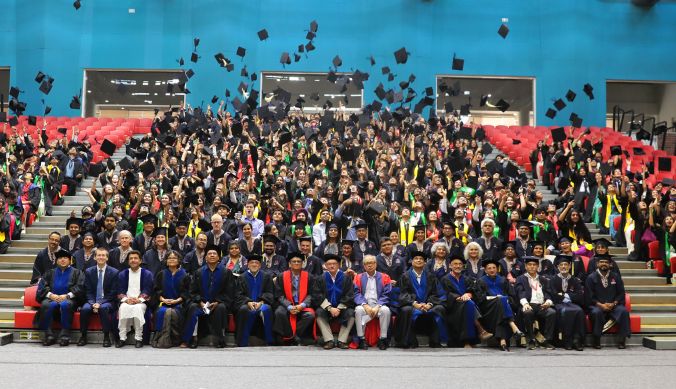Reimagining Finance for the Margins: Swathi’s Path to Purpose
YIF Alumna Swathi Pottabathini (YIF '17) awarded the Joint Japan/ World Bank Scholarship 2023-25
Swathi Pottabathini is a development practitioner and public policy enthusiast with over six years of experience working across grassroots development, state systems, and inclusive finance. Trained as a computer engineer, her curiosity led her to work with people and communities. She then pursued the Young India Fellowship and worked with Samaj Pragati Sahayog-a grassroots nonprofit in India’s central tribal belt. She went on to co-build GramHeet, an agri-tech startup supporting smallholder farmers, and later worked with the Centre for Effective Governance of Indian States (CEGIS), supporting the Government of Telangana in strengthening data-driven governance. At The/Nudge Institute, she led strategy and operations for two major programs: End Ultra-Poverty and Asha Kiran across six Indian states.
Currently, Swathi is pursuing her Master’s in Public Administration – Development Practice at School of International and Public Affairs at Columbia University as a Joint Japan/World Bank Graduate Scholar 2023-25. This fully funded opportunity covering tuition and living expenses is awarded to professionals from emerging and developing economies who are committed to advancing sustainable development.
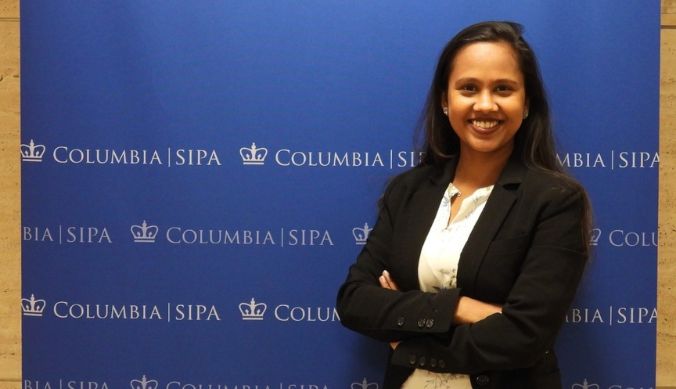
At Columbia, Swathi has embraced an interdisciplinary approach while deepening her expertise in impact investing, sustainable finance, and systems-level change. Through impactful client-based projects, she has designed climate adaptation toolkits for AllianceBernstein, developed a gender strategy toolkit for Enabling Qapital and conducted a market analysis for Johnson & Johnson Impact Ventures during her internship with Village Capital. Beyond academics, Swathi has taken on the role of External Relations Co-Chair of the Columbia Impact Investing Initiative. She also represented SIPA at the 19th Global Public Policy Network Conference in Paris, where her team’s project on climate-resilient agriculture for smallholder farmers earned recognition as one of the top three globally. Her experiences at Columbia have not only sharpened her technical and strategic skills but have also deepened her commitment to reimagining finance as a powerful force for equity, resilience, and long-term impact.
Swathi will be graduating mid May, 2025 and we recently spoke to her about her beginnings, journey, and aspirations. Here is what she had to share:
Tell us about your background?
I was born in Warangal and grew up in a multicultural environment across Gujarat, Maharashtra, and Jeddah, Saudi Arabia. This diverse upbringing exposed me early to different worlds, languages, and ways of life. I excelled academically in school, and many around me encouraged me to pursue a career in civil services. And, I embraced that ambition as well. However, I also had a deep passion for coding and problem-solving, which ultimately led me to pursue a B.Tech in Computer Engineering at COEP Technological University.
At COEP, my education extended far beyond the classroom. I took on leadership roles, serving as the Editor of the college’s century-old magazine, participating in the core organizing team for our college festival, and helping to set a Guinness World Record for the most people simultaneously solving Rubik’s cubes (a record that was later broken, but remains a special moment for me!). During my engineering years, I chose unconventional paths; while many of my peers sought tech internships, I was selected for highly selective and fully funded programs like the Gurukul Fellowship in Dharamshala and the Interfaith Dialogue and Pilgrimage Program organized by the Foundation for Universal Responsibility of His Holiness the Dalai Lama. These experiences opened my eyes to discussions around leadership, ethics, and social change.
As I completed my engineering degree, I realized that a 9-to-5 job behind a computer screen was not where my heart lay and my ambition to pursue civil services remained firm. I found myself increasingly drawn to questions of equity, community, and systemic change—work that involved people, not just programs. Public service felt like a natural progression, but before diving into full-time preparation for the civil services, I wanted to broaden my perspectives, explore liberal studies, and deepen my understanding of the world I hoped to serve. Carrying many questions about development, leadership, and the kind of change I aspired to create, I applied to the Young India Fellowship in 2016—seeking a space where I could expand my horizons and find some of the answers I was searching for.
Your key takeaways from the YIF?
If there’s one thing the world demands today, it’s the ability to think critically and connect ideas across disciplines. At the Young India Fellowship, I had the extraordinary privilege to experience exactly that. Over the course of a single year, I found myself studying philosophy, cognitive science, leadership, history, gender, psychology, science, and art—day after day, class after class. Being taught by some of the finest minds in India—Urvashi Butalia, Gopalkrishna Gandhi, Rudrangshu Mukherjee, AF Mathews, Devesh Kapur—felt like a once-in-a-lifetime opportunity.
Coming from a technical background, it was like stepping into a completely different universe of learning. One day I could be studying Gender, the next Public Policy, and the day after, Physics. It was exhilarating, disorienting, and thrilling all at once. Even today, I often think how powerful it would be if our education system introduced Liberal Studies during Grade 11 and 12—when young people are asked to make life-altering choices without first understanding themselves.
YIF wasn’t just about learning new subjects—it was about unlearning old certainties. As part of a norm-breaking exercise for one of our classes, I painted period blood on my shorts and walked across campus—something that would have been unthinkable for me before. It was deeply uncomfortable, but it forced me to confront how normalized shame and silence around menstruation were. Other classmates broke norms in their own ways: one reclaimed women’s spaces by riding the last metro at night; others experimented with vulnerability by undergoing waxing. It wasn’t just about the acts—it was about questioning the invisible rules that shape our lives.
Some classes pushed me to think, read, and write in ways I had never before. Kunal Joshi’s Critical Writing class, with its relentless focus on precision and depth, taught me that every word must earn its place. For my final paper, I spent days wandering Delhi’s Azadpur Mandi, observing the chaotic dance of trade, and later compared it to Ima Keithel in Imphal, Asia’s largest women-run market. My paper, “Males, Mandis, and Missing Women Entrepreneurs,” was published in Final Draft, YIF’s critical writing journal—a small but meaningful milestone.
And then there were courses that changed not just how I thought, but who I was. Professor Kenwyn Smith’s Group Dynamics class cracked open the polished masks we all wore—we shared stories, sat with each other’s vulnerabilities, and learned the rare art of holding space for others. Professor Mihir Shah’s Political Economy of India’s Development lit something even deeper within me. His grounded clarity and stories from the field made me realize that I didn’t just want to study policies—I wanted to understand how they lived, breathed, and struggled in real villages. So much so that I paused my civil services preparations and chose to work at the grassroots with Samaj Pragati Sahayog.
I could go on telling stories about every single class, every new lens YIF gave me. But if I had to distill it: YIF didn’t just teach me subjects—it transformed the way I thought about knowledge, leadership, and change. It taught me that real learning is interdisciplinary, uncomfortable, and deeply personal—and that to build a better world, we must first learn to see it differently.
Could you elaborate on the impactful work you have done post-YIF?
After YIF, I began my journey at Samaj Pragati Sahayog (SPS) in Madhya Pradesh, working on research and data management. I wasn’t tied to any one vertical, which gave me the opportunity to collaborate with different teams—ranging from Self-Help Groups to Health and Nutrition. What struck me most was how SPS was able to reach communities that many flagship government schemes hadn’t managed to. Outside of work, I spent my evenings with children from nearby villages—teaching them basic English, Math, and Science. Just before I left, I helped set up a small library for them. It remains one of the most fulfilling things I’ve done.
Later, I took a break to prepare for the civil services exams. But after narrowly missing the cut-offs a few times, I took a step back to reflect. That’s when I realized that there are many “means” to the same “end” I had envisioned: creating large-scale social impact.
That realization led me to GramHeet, where I joined the founding team of an agri-tech social enterprise focused on improving incomes for small and marginal farmers. My role spanned everything from fundraising and pitching, to program design and field operations. Sitting down with farmers, understanding their day-to-day struggles, and co-creating solutions with the team taught me what it truly means to build with empathy. When we were named one of Forbes Asia’s 100 to Watch, it felt like a shared celebration of everything we had built together.
I then worked for CEGIS with the Telangana state government’s Panchayati Raj Department to support data-driven governance for over 12,000 Gram Panchayats, helping improve service delivery and resource allocation at the grassroots level.
But one of the most formative chapters in my journey was my time at The/Nudge Institute, where I joined the Centre for Rural Development in a Strategy and Operations role. I had the opportunity to closely support two large-scale programs focused on ending poverty through sustainable livelihoods:
- End Ultra-Poverty (EUP) – a graduation-based model focused on helping ultra-poor households move out of extreme poverty through a blend of asset transfers, financial inclusion, coaching, and livelihoods planning.
- Asha Kiran – a program aimed at building supplementary livelihoods such as goatery and poultry for women in rural geographies.
Together, these programs operated across six states and aimed to reach over 50,000 households. It was a fast-paced, rewarding experience where I worked across project management, stakeholder engagement, and led special projects. A big part of my role involved cross-functional collaboration with tech, fundraising, impact, and finance teams. What I loved most was the flexibility to spend time in the field, speaking with didis about how our programs were impacting their lives in Jharkhand and Uttar Pradesh. This kept the grassroots part of me alive, even while working at the strategy level. What I valued most about The/Nudge was that it encouraged systems thinking while staying grounded in community realities. It reinforced a lesson I carry with me always: real impact requires both scale and soul.
Could you share glimpses from your Journey at Columbia University?
Columbia has been more than just a school—it’s been a journey of transformation. Few places offer the kind of city-campus blend that New York City does, and Columbia has fully embraced it. In the MPA-DP program, I’m part of a close-knit cohort of 50 students from over 15 countries, where every conversation brings a new lens to the global challenges we’re all here to solve.
Inside the classroom, Columbia pushed me to sharpen both my thinking and skills. I immersed myself in courses like Impact Investing, Sustainable Finance, Corporate Finance, Systems-Level Investing, and Accounting. Through the school’s client-based learning model, I worked on real-world challenges: building a practical climate adaptation investor toolkit for AllianceBernstein, and supporting organizational strategy for Land is Life, an Indigenous-led network navigating a leadership transition.
Over the summer, I joined Village Capital’s Impact Investments team, where I led Argentina market analysis for Johnson & Johnson Impact Ventures, supported due diligence for early-stage health equity startups, and built a 400+ company database for Standard Chartered’s Women in Tech program—giving me a front-row seat to early-stage impact investing.
Currently, I’m working with Enabling Qapital to develop a gender strategy toolkit that equips investors with actionable frameworks to integrate gender equity into decision-making. I traveled to Baku, Azerbaijan, to pilot the toolkit with a leading local bank—an experience that reaffirmed how ready financial institutions are to embrace meaningful change when given the right tools.
Beyond the classroom, I sought leadership and practice. As External Relations Co-Chair for the Columbia Impact Investing Initiative, I helped organize events and deepen conversations on finance and social outcomes. Representing Columbia SIPA at the Global Public Policy Network Conference in Paris was another highlight—our project on index-based flood insurance was recognized among the Top 3 globally.
Determined to strengthen not just what I know but how I communicate it, I took a transformative course in Writing and Delivering Speeches. Being at Columbia also meant learning from not just professors, but from global figures like Maria Ressa, Joseph Stiglitz, and Hillary Clinton, who regularly spoke on campus.
But some of my most meaningful learning happened beyond classrooms. Over the past two years, my partner and I have driven over 20,000 miles across nearly 20 U.S. states—through Adobe Pueblos in New Mexico, the wide-open Midwest plains, winding Appalachian trails, and the glowing bioluminescence of Mosquito Bay in Puerto Rico. We witnessed America beyond its coasts—pausing in Great Lakes towns, tracing canyon edges in Arizona, and walking through communities where history, struggle, and hope coexist. Each journey taught quiet lessons—about belonging, inequality, and why inclusive development begins by listening deeply to people and places.
These two years coincided with a pivotal moment in Columbia’s history. In April 2024, the Gaza Solidarity Encampment on East Butler Lawn made campus a focal point of global student activism. Organized by student groups advocating for Palestinian rights, it sparked intense discourse, police intervention, and arrests. Witnessing the protests firsthand, I was struck by the power of student-led movements to influence policy and public dialogue, and the tensions institutions face in responding to urgent calls for justice.
The experiences I had at Columbia taught me to ask sharper questions, build across disciplines, and stay rooted in community—because that’s where real change begins.
What sparked your interest in impact investing? and how has your career evolved in this area?
My understanding of finance has evolved significantly over the years—from seeing it purely as a tool for profit to recognizing its power to drive meaningful social change. Like many, I once believed that working in development was the only way to stay aligned with my values. But during my time at GramHeet, an agri-tech social enterprise I helped build, I found myself grappling with a tough question: How do you stay mission-driven while building something financially sustainable?
That tension led me to Jacqueline Novogratz’s The Blue Sweater, which opened my eyes to the idea of moral, patient, and catalytic capital. It shifted how I thought about finance not just as numbers or markets, but as a force that, when used thoughtfully, could support dignity and equity. Since then, I’ve actively sought opportunities that sit at the intersection of finance and impact. At Columbia University’s MPA program, I furthered this exploration—designing a pilot with Enabling Qapital in Azerbaijan, supporting health equity investments at Village Capital, analyzing ESG and long-term risks with AllianceBernstein, and assisting Dr. Aniket Shah’s course on financing sustainable development.
Each experience has reinforced a simple truth: finance for impact isn’t just about good intentions. It demands rigor, intentionality, equity, and above all, humility. With roots in grassroots development and growing experience in sustainable finance, I hope to bridge these worlds by building models that are not only just and inclusive but also built to last.
What are your aspirations and future goals?
I aspire to reshape how capital flows so that it reaches the people, places, and problems often left out of traditional finance. Too often, those working on the frontlines of change like smallholder farmers, women entrepreneurs, or Indigenous communities lack access to finance that understands their realities. I believe capital should do more than chase returns; it should build resilience, equity, and dignity. Over the years, I’ve come to see finance not just as a technical tool, but as a powerful force that can either entrench inequality or unlock opportunity. My goal is to help design financial strategies that are inclusive, grounded, and built for long-term impact whether through gender-lens investing, blended finance, or systems change.
The Young India Fellowship at Ashoka University gave me the wings to fly. SIPA, Columbia University is helping me chart the course. Together, these experiences have shaped both my values and my toolkit. Ultimately, the change I want to create is simple but ambitious: a world where your zip code, gender, or income bracket no longer determines whether your ideas get funded or your future gets built. I want to make finance more just, more human, and more hopeful.
_______________________________________
A Young India Fellow, from the Class of 2017 and World Bank Scholar 2023-25, Swathi Pottabathini believes real change begins by listening deeply—to people, communities, and the land. She works at the intersection of finance and development, and finds joy in teaching yoga and making sustainable art.
Study at Ashoka








